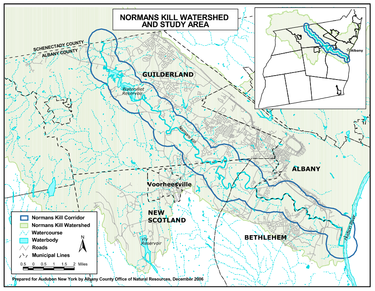Property along the Normanskill considered for conservation easement
GUILDERLAND — The town has its first applicant for a conservation easement — for 57 acres off of Wormer Road.
“It’s right where the Normanskill Creek goes by this big gorge,” Supervisor Peter Barber told the town board members at their Sept 20 meeting. “There’s a bird sanctuary.”
The town’s planner, Kenneth Kovalchik, and its park director, Colin J. Gallup, walked the property, Barber said, and were “just very, very impressed.”
A committee that has been set up to review easement requests will also walk the property, Barber said, and report to the town board, which will decide whether to grant the tax break.
“That’s a big one,” Barber said.
If granted, the easement would reduce the town’s tax burden on the property depending on the length of time the property owner commits to leaving the land undeveloped.
“We want to make sure we have as many tools as possible to preserve open space ...,” Barber told The Enterprise in 2021, just after the state legislation making the exemption program possible was signed into law. “There could be people out there who want their land protected,” he said.
In 2009, a section of the state’s Real Property Tax Law made the authorization for certain towns. In 2017, the neighboring town of Bethlehem set up such a program through Albany County legislation. Guilderland went through the state rather than the county.
Guilderland’s local law applies just to town tax breaks, not to county or school taxes; school taxes are the most significant. The school districts — Guilderland had five — and the county would have to be asked to provide the same tax relief. Ultimately, elected school board members would have to approve the school tax breaks.
Guilderland’s law has several lengths of time commitment; the longer the time commitment, the greater the tax break. A perpetual commitment nets a 90-percent tax break.
Penalties for offenses are stiff.
Part of President Joe Biden’s climate-change agenda is protecting 30 percent of United States lands and ocean territories by 2030, known as “30 by 30.” Currently, about 26 percent of the United States’ ocean territories are protected but only about 12 percent of the nation’s land area is protected.
The protection is meant to stem climate change since natural landscapes pull carbon dioxide from the atmosphere and store carbon in trees, shrubs, grass, and soil.
As of 2016, fifty-six million acres of land had been voluntarily conserved in America, according to the National Land Trust Alliance.
In New York, over 90 land trusts and the Department of Environmental Conservation have worked to protect over 2.7 million acres, placing the state fifth in the country behind Maine, with about 5.8 million acres; California, with close to 5 million acres; Montana, with 3.5 million acres; and Colorado, which has about 3 million acres of protected land.
Towns and land trusts can help landowners find the conservation program that best benefits their property.
Overage water rates set
The town board increased rates for residents whom one board member termed “water hogs” — those using over 30,000 gallons in a cycle. The base rates will remain the same for residents using fewer than 30,000 gallons.
Barber noted that summer water use doubles in Guilderland as residents water lawns and fill pools, causing the town to pay neighboring municipalities for the extra water.
The new “overage” fees will “actually encourage water management,” said Councilwoman Amanda Beedle.
In making the request, Tim McIntyre, who oversees water management for the town, wrote in a memo to Barber, “After tracking our current financial status, to no surprise our cost[s] of operation have increased substantially with electricity, fuel, chemicals and supplies increasing 50 to 100 percent with no apparent signs of relief. It has become painfully obvious that an increase to our current water rate structure is warranted to absorb these costs.”
Hazardous waste
David Corey, foreman at Guilderland’s transfer station, told the board about the Oct. 22 Household Hazardous Waste Collection Day. The collection runs from 8 a.m. to 2 p.m at the town’s highway department at 6338 French’s Mill Road.
“Our big change this year is we’re not doing the document shredding anymore,” said Corey, citing the $4,000 cost last year.
Representatives from paint companies will be on hand to collect unused paints “so the town won’t get charged,” he said.
Corey praised the new law that allows local residents to take their unused paint to the Sherwin Williams store at 20 Mall to dispose of it for free. “When you buy paint, there’s a fee so you’re paying for it anyway,” Corey said of the disposal costs.
Residents on Oct. 22 should bring proof of residency, said Corey, urging, “Just don’t show up too early because it creates a traffic problem … You’re in and out of there really quick.”
Other business
In other business on Sept. 20, the Guilderland Town Board:
— Scheduled a public hearing for Nov. 15 at 7 p.m. on a proposed local law to amend fees;
— After months of discussion, adopted guidelines — as opposed to rules — for both members of the public and boards in town holding meetings.
Rules have to be enforced, said Councilwoman Christine Napierski who suggested the word change, but a guideline is a recommendation giving board chairs more discretion “to do what they think is appropriate”;
— Authorized the town court to apply for a grant, up to $30,000, from the Justice Court Assistance Program. Barber said the money would be used in part for a new metal detector “which is sorely in need of replacement”;
— Authorized spending federal pandemic-related funds from the American Rescue Plan Act, including $28,091.63 to replace carpet on the first floor of Town Hall, $7,356.00 to replace locks at Town Hall, and $9,780.00 for a Spirotherm air and dirt separator for the heating, ventilation, and air-conditioning system;
— Agreed to work with two engineering firms on two town projects — with CHA Companies on the sidewalk running along the east side of Carman Road from Western Avenue to Old State Road and with Creighton Manning for replacing the town-owned culvert on Grand Street in Altamont.
Donald Csaposs, the town’s grant writer, explained in a memo to Barber that he decided to follow the lead of local municipalities that streamlined the process to select engineers by working from a “short list” of the 15 firms approved by the state’s Department of Transportation.
Three firms with “extensive experience in Guilderland” were rated and all three — CHA, Creighton Manning, and Greenman Pederson — “scored in a virtual tie,” Csaposs wrote, “and the conclusion was that any of the three could reasonably be selected for any project.”
CHA and Creighton Manning were recommended for the projects at hand, he said, because they had been “helpful in responding to technical questions related to the grant applications that were successful”;
— Authorized the town attorney and building department to take complaints about neglected property at 32 Venezio Ave. to the state’s Supreme Court — the lowest level in New York’s three-tiered system — to remedy ongoing complaints.
“It’s a last step,” said Barber. “The property has been vacant for two years. The person passed away. There’s no estate. It’s just not being maintained at all.”
A town worker managed to mow the front lawn but “there’s too much stuff in the backyard,” Barber said, including lawnmowers. The grass, he said, is “several feet high” in violation of the state’s property maintenance code.
The town’s 2022 assessment roll lists the property as having a full-market value of $223,077.
Beedle said the property was slated to be foreclosed on by the end of the year or early next year;
— Released escrow for the Winding Brook Drive Apartments. The town is returning $215,512.89, which is the original amount of $221,000 plus interest less $5,500, which will remain in escrow until the site’s landscaping is completed;
— Provisionally appointed Mansi Parmar as senior planner;
— Made these appointments, each from Oct. 1, 2022 to Sept. 30, 2027, to the board of assessment review as recommended by the assessor: Nicole Ventresca-Cohen, Teresa Freeman, and Nancy Klopfer. The board also appointed William Meehan to the board from Oct. 1, 2022 to Sept. 30, 2023.
He’s filling one year for someone who is “not around on Grievance Day,” said Barber; and
— Approved “Plum Lane” as the name of a private lane at 6185 Johnston Road. According to a memo from assessor Heather Weinhold, Eric Li is subdividing his Johnston Road property into three parcels. The two other names on the list were Northeast Lane and Lis Lane.
“I always go with the first one listed,” said Barber.


